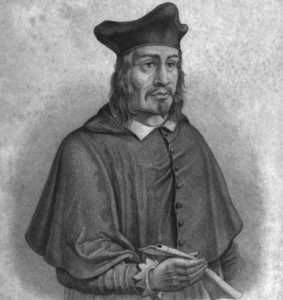
Johann Angelus Silesius (also known by his birth name Johannes Scheffler) was a 17th-century poet. His best known text is the Cherubinic Wanderer, originally published in German as the Cherubinischer Wandersmann. The Wanderer contains over 1,600 short poems. Topics include mystical theology, the sorcerers’ stone from 17th-century alchemy, fantastic beasts, divine riddles and paradoxes, and the hero’s journey.
Though the Cherubinic Wanderer contains so many poems, most are short. Very short. They’re nearly all epigrams. Epigrams are poems that make a single pithy point in just a few lines, and Angelus’s are especially pithy. In two lines he delivers advice about money, or a joke about daily life, or a profound insight about the Trinity. The epigrams have no particular order in the Wanderer, but as a whole they describe the soul on its way from hell to heaven. The soul wrestles with devils, wars like a king, is courted like a bride, encounters sacred geometry, undergoes spiritual alchemy, and at last “becomes God.”
Translating Angelus’s Cherubinic Wanderer
The topics in Angelus’s Wanderer have enormous appeal to modern audiences. But those audiences face two hurdles. First, there’s no complete English translation. Angelus wrote in German, and even the best translator (Maria Shrady) only translated half the text. Second, most translations of the Wanderer leave the epigrams in their original order. A jumble of themes confronts the new reader, who may easily lose the forest for the trees.
The solution? Translate the poems by topic! My first book of translations, The Sorcerers’ Stone, features Angelus’s poems about alchemy. Angelus often portrays the Christian life as an alchemical transformation, as the soul changes from lead to gold. Angelus envisions God as a master alchemist in a divine workshop. God uses fires, tinctures, and even the sorcerers’ stone to do His work on the soul.
My second book of translations will feature the hero’s journey. Angelus portrays the soul as a knight errant, wrestling with death while questing for Paradise. Along the way, the soul must win battles and kill dragons.
The soul is not just a hero, however. It’s also a bride. Angelus describes the human soul as God’s long lost love, unhappy until she returns to Him. Other epigrams describe the soul as a betrothed virgin, a princess waiting for her groom, and a queen who will become a goddess. Though the bride’s journey looks different from the hero’s journey, both end at the same place: the soul’s deification in the presence of God.
Further topical translations from the Wanderer will include the art of being an angel, the inner life of God, and the cosmic drama that transpires when God becomes man.
Thus far I’ve completed 300+ epigrams. I’m publishing them in groups of around 100 on each topic, with each book including the German text for comparison. This site is also one of the few places on the web to find the full German text of the Cherubinischer Wandersmann.
For updates on my pending translations, sign up for my newsletter on Logic, Latin, and Literature.